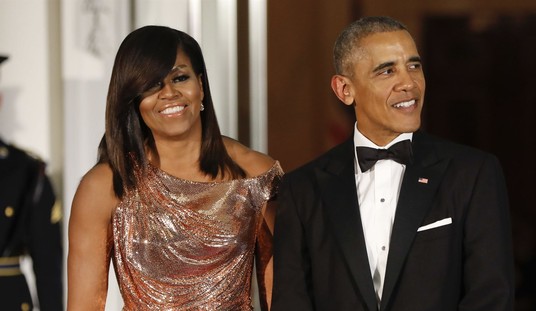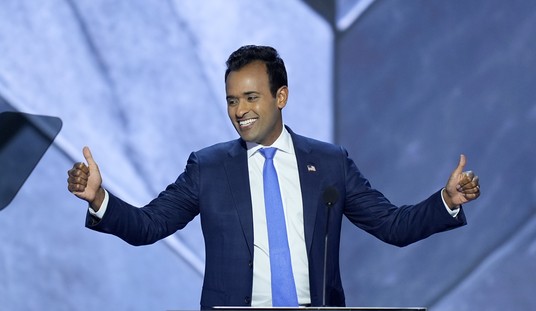A pair of new obits for Walter Cronkite help to place his legacy into perspective. First up, in Maclean’s, Mark Steyn writes:
The media’s sense of proportion is never more out of whack than when bidding farewell to some iconic figure from its glory days, and one had high hopes that the eulogies for Cronkite might surpass the impressive new records in risibility set by the coverage of Washington Post doyenne Kay Graham in 2001: “The Most Powerful Woman In America,” “The Most Powerful Woman In The World,” “America’s Queen,” “Kay’s Amazing Grace,” “Oh, Kay,” “Special Kay”. . .
No “Kay. Why?” oddly enough. There was an element of triumphalism in all this: Mrs. Graham was a central figure in what the J-school bores regard as American journalism’s finest hour—Watergate. Bliss was it in that dawn to be alive! A mere eight years has passed since Kay Graham’s death, but the smug complacency that characterized her eulogies was noticeably absent from Cronkite’s, which mostly read like obituaries for an industry. It’s sunset, and it’s no longer bliss: the heir to Cronkite, Katie Couric, is the champion limbo dancer of evening-news ratings; the New York Times, the oracle from which all three network newscasts take their cue, is now junk stock. It turns out Walter Cronkite and Michael Jackson have quite a bit in common: both performers peaked circa 1980, and did very little these last two decades. In that sense, they belong culturally to the same generation. They represent the zenith of a shared, universal popular culture: Jacko’s Thriller was the biggest-selling album of all time ever; Cronko’s newscast was the most-watched in America. Barring dramatic and severe government control of technology, no CD and no news show will ever be that big again. And, when you think about it, millions of teenagers going out and buying the same slickly manipulative pop record is less weird than millions of grown-ups agreeing they’ll all get their world view from the same source. But (all together now, again) “that’s the way it was” back in the days when ABC, CBS, NBC, the New York Times and the Washington Post functioned as a co-operative monopoly.
Michael Jackson, of course, embodied (literally) the cult of youth, albeit in extreme form. I can’t recall whether it’s an actual bona fide fact or just a stray firecracker that popped in Larry King’s head and rolled off his tongue a nanosecond later, but somewhere or other in the Jacksonian obsequies someone said that the 50-year-old singer was on hormone treatment to keep his voice high. There surely is an emblem of the times. Last year, Diana West wrote a book called The Death of the Grown-up. But now even the world’s oldest, squeakiest adolescents are dying, too.
And at her Death of the Grown-Up blog, West is, if anything, even rougher on Cronkite:
So, to use his own words, was Walter Cronkite an honorable journalist who did the best he could?
No. What may — may — have resulted from forgivable misimpressions due to the “fog of war” long ago crystallized into obdurate lies. Cronkite never clarified the record, never admitted that the Tet offensive — the Vietcong’s surprise holiday attack on cities across South Vietnam — resulted in a military and political fiasco for North Vietnam.
This was becoming apparent even before the dust had settled in 1968, as we learn in Peter Braestrup’s indispensable “The Big Story” (1977), one of the signal historical works of the 20th century, which meticulously analyzes the media’s failure to assess Tet correctly as a defeat for North Vietnam. Even Leftist journalist Frances Fitzgerald in her Pulitzer Prize-winning “Fire in the Lake” (1972) reported that Tet had “seriously depleted” Vietcong forces and “wiped out” many of their “most experienced cadres,” noting that such losses drove “the southern movement for the first time into almost total dependency on the north.” Her conclusion: “By all the indices available to the American military, the Tet offensive was a major defeat for the enemy.”
And the enemy agreed. In a 1995 interview with the Wall Street Journal, Bui Tin, a member of the North Vietnamese general staff who in 1975 personally received the unconditional surrender of South Vietnam, called North Vietnam’s losses in Tet “staggering.” Communist forces in the South, he explained, “were nearly wiped out by all the fighting in 1968. It took us until 1971 to re-establish our presence, but we had to use North Vietnamese troops as local guerillas. If the American forces had not begun to withdraw under Nixon in 1969,” he added, “they could have punished us severely.” And who knows? If Cronkite had not used Tet to nudge for negotiations, maybe American forces would not have begun to withdraw.
Bui Tin said North Vietnamese commander Gen. Vo Nguyen Giap told him Tet was “a military defeat though we had gained the planned political advantages when Johnson agreed to negotiate and did not run for re-election.”
Well, who could blame him? The president had “lost Cronkite.”
And so be it. The president lost Cronkite, the United States lost Vietnam. But why are the rest of us still stuck with Cronkite’s Orwellian packaging as “America’s most trusted newsman” 41 years after he totally and calamitously and obstinately blew Tet? The ongoing genuflection before “Uncle Walter” reveals something mighty weird about this body politic — something beyond the ken of a mere journalist, something more in the line of work of a really good shrink.
In case you missed it earlier in the week, Noel Sheppard, Austin Bay and I discussed Cronkite’s legacy here:
About which, Stacy McCain satirically (I hope!) writes:
The Most Trusted Man in New Media has an excellent video examination of Uncle Walter’s legacy, with contributions from Noel Sheppard and Austin Bay.
Frankly, I’m becoming worried. Ed hasn’t been linking quite so much lately and . . . Well, if I’ve lost Ed Driscoll, I’ve lost the blogosphere.
Heh. Of course, as Glenn Reynolds wrote in the immediate wake of the scandal which laid low Cronkite’s immediate successor, the great thing about the Blogosphere is that it’s a low-trust environment:
The world of Big Media used to be a high-trust environment. You read something in the paper, or heard something from Dan Rather, and you figured it was probably true. You didn’t ask to hear all the background, because it wouldn’t fit in a newspaper story, much less in the highly truncated TV-news format anyway, and because you assumed that they had done the necessary legwork. (Had they? I’m not sure. It’s not clear whether standards have fallen since, or whether the curtain has simply been pulled open on the Mighty Oz. But they had names, and familiar faces, so you usually believed them even when you had your doubts.)
The Internet, on the other hand, is a low-trust environment. Ironically, that probably makes it more trustworthy.
That’s because, while arguments from authority are hard on the Internet, substantiating arguments is easy, thanks to the miracle of hyperlinks. And, where things aren’t linkable, you can post actual images. You can spell out your thinking, and you can back it up with lots of facts, which people then (thanks to Google, et al.) find it easy to check. And the links mean that you can do that without cluttering up your narrative too much, usually, something that’s impossible on TV and nearly so in a newspaper.
(This is actually a lot like the world lawyers live in — nobody trusts us enough to take our word for, well, much of anything, so we back things up with lots of footnotes, citations, and exhibits. Legal citation systems are even like a primitive form of hypertext, really, one that’s been around for six or eight hundred years. But I digress — except that this perhaps explains why so many lawyers take naturally to blogging).
You can also refine your arguments, updating — and even abandoning them — in realtime as new facts or arguments appear. It’s part of the deal.
This also means admitting when you’re wrong. And that’s another difference. When you’re a blogger, you present ideas and arguments, and see how they do. You have a reputation, and it matters, but the reputation is for playing it straight with the facts you present, not necessarily the conclusions you reach. And a big part of the reputation’s component involves being willing to admit you’re wrong when you present wrong facts, and to make a quick and prominent correction.
When you’re a news anchor, you’re not just putting your arguments on the line — you’re putting yourself on the line. Dan Rather has a problem with that. For journalists of his generation, admitting an error means admitting that you’ve violated people’s trust. For bloggers, admitting an error means you’ve missed something, and now you’re going to set it right.
What people in the legacy media need to ask themselves is, which approach is more likely to retain credibility over time? I think I know the answer. I think Dan Rather does, too.
Of course, having had his Orwellian moment in 2004, Dan Rather is now channeling the “We had to destroy the village in order to save it” quote likely invented by fellow disgraced old media hack Peter Arnett. Rather writes, “A truly free and independent press is the red beating heart of democracy and freedom,” and the only way to save it in Dan’s view is to make it less free.
Update: Cronkite’s passing gives Larry Sabato a flash of the blindingly obvious: “Are the Top Journalists Insiders or Outsiders?”
Following Cronkite’s famous 1968 Tet Offensive broadcast, viewers came to understand that Cronkite was opposed to the Vietnam War, though this opposition was presented as the result of the anchorman’s immediate reporting during and after the Tet fighting. Assuming Mankiewicz’ memory is accurate–and there is no apparent reason to question it–Cronkite had obviously made up his mind about Vietnam far earlier.
Decades later, everyone knows that Cronkite was a Democrat. After his retirement, he gradually made no secret of his party affiliation and philosophy. But at the time, CBS went to great pains to present him as nonpartisan, and most Americans accepted that this was true. (The other networks played the same game with their anchors, whatever their underlying political philosophy–and not all were Democrats, by the way.) Now we learn that Cronkite was prepared to run for vice president on the 1972 Democratic ticket, had he been asked.
But it is the 1967 Cronkite meeting with Robert Kennedy that stuns. Cronkite willingly became an active player in national politics, choosing a personal favorite for president and directly attempting to induce a prominent politician to run for the White House. Are we to believe that Cronkite’s private importuning had no effect on his reporting? Can anyone defend this as even vaguely ethical for a man in his position? Cronkite was a citizen, of course, and if his views on Vietnam and his preferences for president were strong, he had the option to step down as anchorman and enter the political arena in some fashion. Or he could have transitioned into a newspaper columnist or TV commentator, openly pushing the agenda of his choice. Instead, Cronkite had his political cake and ate it journalistically, too.
All of this suggests what most people have always supposed: there is a partisan predisposition among some of those at the top of the journalism profession, despite their denials. Furthermore, some elite journalists do not step back from their bias but privately seek to re-make the world as they prefer it to be.










Join the conversation as a VIP Member